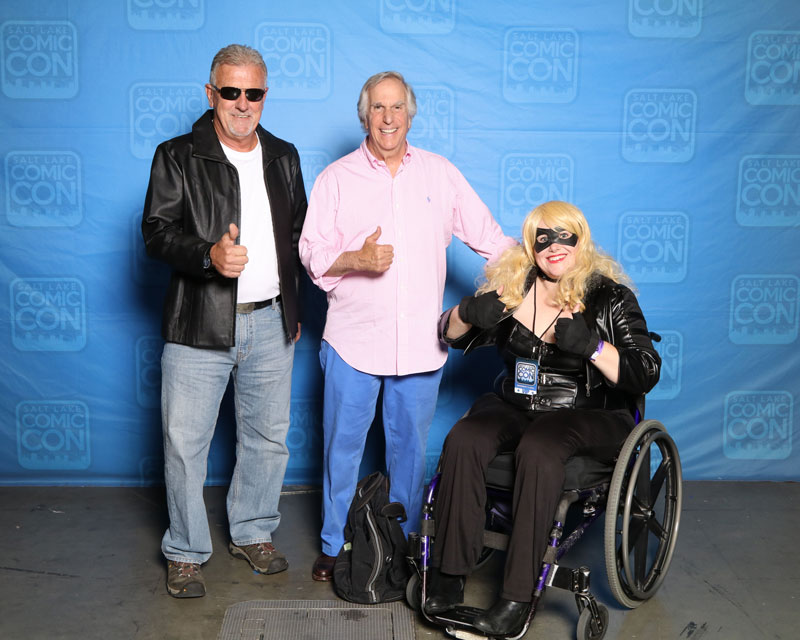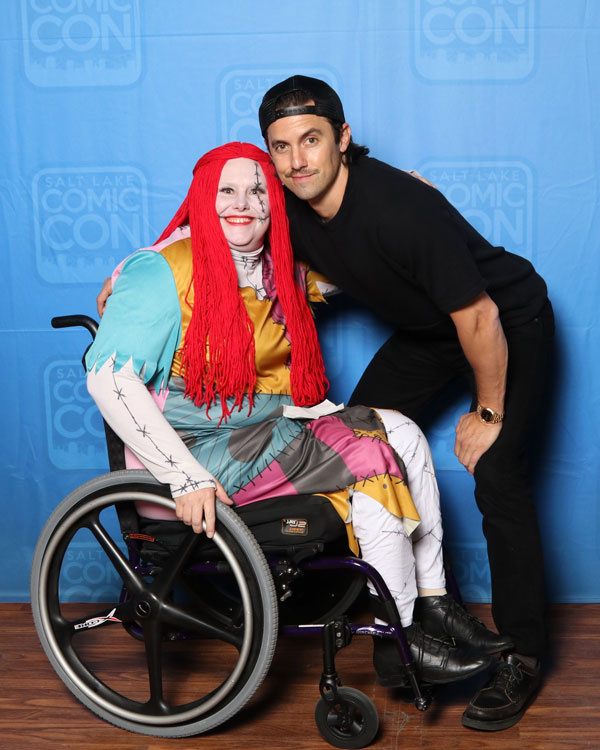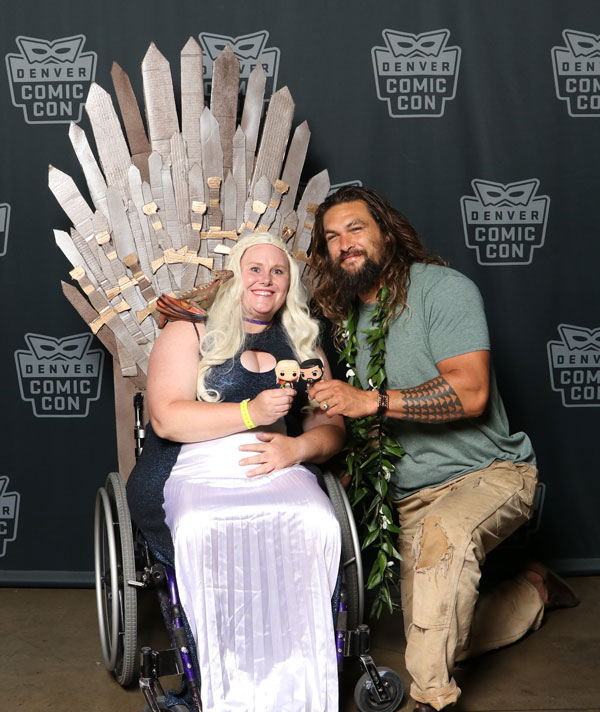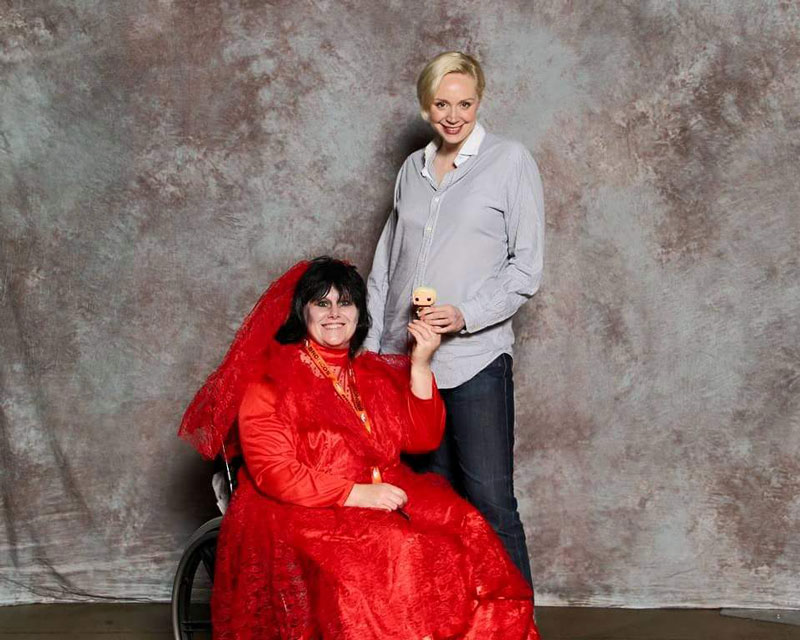For many of us, it's October that is actually the "most wonderful time of the year." This month is the only time when it's socially acceptable to dress up like our beloved characters from our favorite TV shows, comics, cartoons, movies, video games, and even anime. However, if you enjoy creating and wearing costumes, you don't have to wait until Halloween. The cosplay (costume play) community prides itself on its craftsmanship and has a collective presence at various conventions and video game tournaments. These events are hosted by a wide array of people and are frequented by people from just about every walk of life.

For anyone who identifies as a cosplayer, there's a certain level of love that goes into each costume. On one end, creating the cosplay is an intricate process. It allows people to show off their talents as well as the admiration they share for their favorite shows and comics. I had the opportunity to connect with Melissa Weisser, who regularly attends conventions. As a fellow wheelchair user, I was interested to learn more about her experiences with the community and the kind of planning that goes into designing a "wheelchair-appropriate" cosplay.
Halloween has always been one of Melissa's favorite holidays. For her, cosplay is an extension of that, and so much more: "My brothers told me about comic cons, as they were into them way before the surge of comic book movies. When I would look at photos and see the chance to meet some of my favorite celebrities that I've adored, plus the chance to dress up in different costumes, it was like a dream come true for me." Conventions have become an integral part of Melissa's life, and she looks forward to attending them on an annual basis. What's more, these conventions offer many accommodations for people with disabilities, which make their experiences more accessible. Melissa describes that people with disabilities are permitted into celebrity panels before other convention attendees. In addition, people with disabilities are allowed front-of-line access when meeting and taking pictures with celebrities. Obviously, this privilege isn't intended to give people with disabilities priority over able-bodied convention goers; waiting in line can be difficult for some people with disabilities, as it relates to chronic fatigue, chronic pain, anxiety, or maneuvering a wheelchair or other adaptive device through narrow lines.

As a wheelchair user, I was particularly interested to get Melissa's take on cosplay practicality. When building a cosplay, what do wheelchair users need to consider that an able-bodied designer wouldn't have to worry about? For one, people with disabilities should build cosplay around their prosthetics, mobility devices, medical devices, and physical limitations. Safety and practicality need to play an integral role in design: "I found out real fast that my first costume, the Beetlejuice bride, was a horrible choice. The huge lacy dress was continuously getting caught in my wheels and itched like crazy. I couldn't get home fast enough to change. My Sally outfit is my safety net/backup costume as it's very comfortable, easy to put together, and always gets a great response. As I've gotten more experienced in cons and cosplay, I've pushed my imagination to start including my wheelchair in the costume. Having a manual wheelchair as opposed to a power wheelchair makes it more difficult for incorporating the wheelchair. I need to be able to have full access to the tires to move around."

Of course, there are always pieces that stand out above the rest: "Without a doubt my iron throne has been my greatest success. It was so much fun and the celebrities I met that day absolutely loved it. The only problem was that I couldn't manage it and my backpack of supplies on my own. Luckily my dad has enjoyed going with me for at least one day to cons. He has made it possible for me to push my imagination and think outside the proverbial box."
Whether you have a disability or are able-bodied, preparing a cosplay can require a significant amount of planning. Setting a roadmap for the future is important because certain cosplays can have a greater impact, depending on the event that you attend. For instance, Melissa has wanted to create a mermaid piece for some time. However, a couple of factors have prevented her from pursuing it. For her, picking the most appropriate cosplay involves a great deal of factors, including both patience and flexibility: "I kind of wait and see what the big movies are for the year. See if anything jumps out at me or inspires me. I'm trying to learn not to plan your cosplay around a celebrity attending the event because they can, and do, cancel at the last minute." These are important tips to consider, especially for those either seeking to enter competitions for their cosplay, or those who are interested in gaining a professional level of exposure.

Melissa's passion for cosplay has made a significant impact on those whom she's met, just as the community has made a lasting impression on her. Cosplay seems to function as a great equalizer of sorts: "I feel like I'm just like everybody else when I'm there and dressed up. Like, I'm standing out because of my cosplay, not because of my wheelchair." At conventions, the cosplay community gives Melissa a sense of belonging. The picture that it paints is simultaneously beautiful and unique. I don't want to say that disability and able-bodiedness no longer matter. In reality, of course they do. Cosplay acts as a mutual space, shared by the disability community and able-bodied people, in a rare and fascinating way. Neither disability nor able-bodiedness matter. What's left is the connection, the strong adhesive which holds the community together. This kind of bond can only be described as magical. What's more, Melissa's involvement in the community will help to combat negative stereotypes about people with disabilities. Her very presence prompts people with disabilities to be proud of who we are. Melissa demonstrates that disability can give us the opportunity to be uniquely creative, and to make connections that wouldn't have happened otherwise.
About the Author
Around the age of one, I contracted bacterial meningitis. When I was three, I began using a power wheelchair. I've always embraced my disability and taken pride in knowing that I was different than my peers. My desire to learn more about disability led me to study critical disability theory both as an undergrad and a graduate student. I've always been passionate about gaming, which influenced me to write my Master's thesis on accessibility and video games as it relates to gamers with disabilities. In my spare time I love competing in local tournaments for Super Smash Bros., reading fantasy and sci-fi novels, and writing.
Kyle's ride is a QUICKIE S-636.
Most of the stories here on LiveQuickie.com were submitted by readers. Do you have a story to tell? We'd love to hear it. Submit your story here.